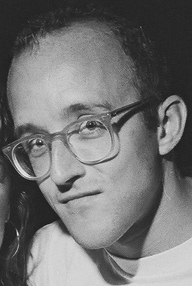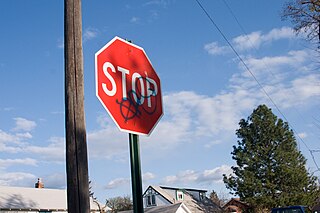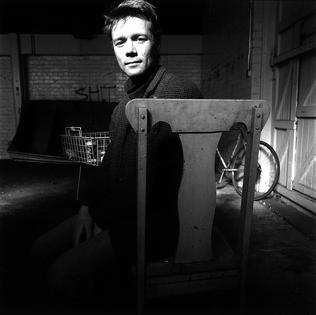
Graffiti is writing or drawings made on a wall or other surface, usually without permission and within public view. Graffiti ranges from simple written "monikers" to elaborate wall paintings, and has existed since ancient times, with examples dating back to ancient Egypt, ancient Greece, and the Roman Empire.

Keith Allen Haring was an American artist whose pop art emerged from the New York City graffiti subculture of the 1980s. His animated imagery has "become a widely recognized visual language". Much of his work includes sexual allusions that turned into social activism by using the images to advocate for safe sex and AIDS awareness. In addition to solo gallery exhibitions, he participated in renowned national and international group shows such as documenta in Kassel, the Whitney Biennial in New York, the São Paulo Biennial, and the Venice Biennale. The Whitney Museum held a retrospective of his art in 1997.

Street art is visual art created in public locations for public visibility. It has been associated with the terms "independent art", "post-graffiti", "neo-graffiti" and guerrilla art.
George Lee Quiñones is a Puerto Rican artist and actor. Quiñones rose to prominence by creating massive New York City subway car graffiti that carried his moniker "LEE". His style is rooted in popular culture and often with political messages.
Rupert James Betheras is a former Australian rules footballer and a contemporary artist, whose practice has largely been painting-based and also involved installation and sculpture. As a painter, Betheras began as a teenage graffiti artist on the streets of Melbourne.

Mirka Madeleine Mora was a French-born Australian visual artist and cultural figure who contributed significantly to the development of Australian contemporary art. Her media included drawing, painting, sculpture and mosaic.

Melbourne, the capital of Victoria and the second largest city in Australia, has gained international acclaim for its diverse range of street art and associated subcultures. Throughout the 1970s and 1980s, much of the city's disaffected youth were influenced by the graffiti of New York City, which subsequently became popular in Melbourne's inner suburbs, and along suburban railway and tram lines.
SAMO is a graffiti tag originally used on the streets of New York City from 1978 to 1980. The tag, written with a copyright symbol as "SAMO©", and pronounced Same-Oh, is primarily associated with the artist Jean-Michel Basquiat, but was originally developed as a collaboration between Basquiat and Al Diaz.

Graffiti is writing or drawings scribbled, scratched, or sprayed illicitly on a wall or other surface in a public place. Graffiti ranges from simple written words to elaborate wall paintings. Graffiti, consisting of the defacement of public spaces and buildings, remains a nuisance issue for cities.

ROA is a graffiti and street artist from Ghent, Belgium. He has created works on the streets of cities across Europe, the United States, Australia, Asia, New Zealand and Africa. ROA generally paints wild or urban animals and birds that are native to the area being painted. ROA usually uses a minimal color palette, such as black and white, but also creates works using vibrant colours depicting the flesh or internal systems within the animals and birds.
"ROA treats each surface he paints like a space to investigate, play with, and fit his creatures into. The technical perfection of his painting belies an underlying resourcefulness with simple tools,” “The animals are matched to their location, with rats in New York City and elephants in Bangkok. There are dark and funny messages, the beauty of both life and death, universal metaphors, inside jokes, and occasional violence, but always in ways that honor the animals and the spaces where they are painted."
Mark Strizic was a 20th-century German-born Australian photographer, teacher of photography, and artist. Best known for his architectural and industrial photography, he was also a portraitist of significant Australians, and fine art photographer and painter known for his multimedia mural work.

David Larwill (1956–2011) was an Australian artist recognisable by his distinctive and exuberant style based on bold colour, stylised figures and simplified form. Although best known as a figurative expressionist painter, Larwill was also a draughtsman and printmaker of note. He produced many drawings, watercolours, ceramics and sculptures as well as etchings, lithographs and screenprints. In a career that stretched over 30 years, Larwill held over 25 solo exhibitions and participated in scores of group shows.

Crack Is Wack is a mural created in 1986 by American artist and social activist Keith Haring. Located near the Harlem River Drive in the East Harlem neighborhood of Manhattan in New York City, the mural serves as a warning against crack cocaine use, which was rampant in major cities across the United States during the mid to late 1980s. As a symbol of anti-drug activism, Crack Is Wack commemorates Haring's powerful sociopolitical presence as an artist and remains a part of New York City's repertoire of iconic public art.

A Pile of Crowns for Jean-Michel Basquiat is a 1988 painting created by American artist Keith Haring. The artwork was made to memorialize his friend, artist Jean-Michel Basquiat. It depicts a towering pile of Basquiat's trademark crowns.

Angel Ortiz, known publicly as LA II or LA2, is an American graffiti artist and visual artist of Puerto Rican descent from the Lower East Side who is known for his collaborations with Keith Haring. Ortiz's contributions to Haring's work, including his trademark graffiti infill squiggles, have notably been obscured by the art establishment, which has prompted Ortiz's supporters, including artist, photographer, and videographer Clayton Patterson, to publicly uplift Ortiz's work and ask for credit to be given.
Angela Cavalieri is an Australian printmaker, whose work recreates text and narratives in visual form and was included in the Venice Biennale, 2011.

Todos Juntos Podemos Parar el SIDA is a mural created by American artist and social activist Keith Haring in 1989. The mural was painted to raise awareness to the AIDS epidemic. It is located next to the Museu d'Art Contemporani de Barcelona museum in the El Raval neighbourhood of Barcelona.

Andy Mouse is a series of silkscreen prints created by American artist Keith Haring in 1986. The character Andy Mouse is a fusion between Disney's Mickey Mouse and Andy Warhol. The series consists of four silkscreen prints on wove paper, released in an edition of 30 per colorway, all signed and dated in pencil by Haring and Warhol.

Tuttomondo is a mural created by American artist Keith Haring in 1989. Located on the rear wall of the Sant'Antonio Abate church in Pisa, it is one of the last public murals executed before his death from AIDS-related complications in 1990. It is also one of the few outdoor public works created by Haring for permanent display.

Collingwood Yards is a not-for-profit arts organization and arts precinct located in Collingwood, a suburb of Melbourne, Australia. Collingwood Yards hosts visual artists, musicians, performers and a range of arts organisations across a large inner city site and forms part of the Collingwood Arts Precinct which includes Circus Oz. It provided accommodation to more than thirty Arts-related organisations on a not-for-profit basis.














